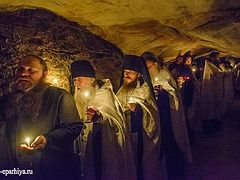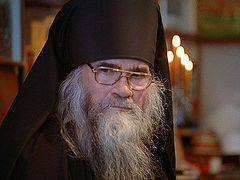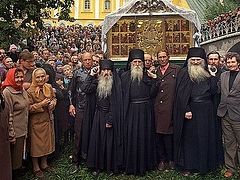Early last Saturday morning, April 29, 2018, Archimandrite Adrian (Kirsanov) received Holy Communion—and then soon afterwards gave up his spirit to the Lord. The news of his repose spread around Russia like lightning, and everyone who knew him was already making plans to come to Pechory for his funeral. Pechory is the home of Fr. Adrian’s last earthly home, the glorious, historical Pskov Caves Monastery, a one-hour drive from the city of Pskov, and an eight-hour drive from Moscow. The train reservations quickly filled up, and cars seats were being meted out.
Elder Adrian was 96 years old when he died. He had suffered from various and sundry ailments for decades, any of which would have been enough for a man to feel very poorly, and in his final years it became harder and harder for him to receive people. He was also usually surrounded by a wall of well-meaning cell attendants who strove to preserve his strength, to keep him alive in this vale of tears, so that his spiritual children would not be completely bereft of his support. So many wanted to come to him for advice that he had to limit his contact; furthermore people like him sense when their birthday into eternal life is drawing nigh, and they thirst for time alone with God as they are about to be with Him forever.
This is apparently how it was for Fr. Adrian. Just a couple of weeks before his repose, when he had begun to feel especially bad physically, he said to someone near him, “Soon I’ll be well and I’ll receive everyone!” And that is exactly what happened. I, a sinner, who had not seen him for twenty years, found myself in a car the next day and was on my way to the monastery and the elder, both of which had always meant the world to me.
Many of those who knew Fr. Adrian are still quietly contemplating just what the elder meant to them, and to the whole world. His departure marks the end of the line of Pskov-Cave Elders, and possibly of the last of Russia’s known, true elders who had passed through the furnace of suffering that was soviet life, who had been formed into diamonds under the onerous repressions and persecutions against those who remained faithful to Christ’s holy Church. The anti-Christian manhunts seemed to seep into every aspect of life, and for many years were virtually inescapable, especially for those who had openly given their lives to Christ as servants of His Church. The Lord led them through these difficult times and raised them up so that they could help His flock, to feed His sheep. He generously bestowed spiritual gifts upon them for this purpose. And although they carefully hid these gifts, they stood out as pillars, as beacons and lighthouses for the faithful.
Elder Adrian, in the world Alexei Andreyevich Kirsanov, was born March 17, 1922 in the village of Tureika, in Trosnyanksky region of Orlov Province, to a peasant family. He and his brother Mikhail and sister Vera were brought up in Christian piety. Alexei lost his father as a child, and his mother, Theodosia Spiridonovna, was left to raise her children through very difficult times of hunger and poverty. After the Bolshevik revolution, the peasantry experienced the direly painful process of collectivization, forced relocation to desolate areas, famine and want. This was all happening as the future elder was growing into manhood
Alexei was a youth when the fierce persecutions of the 1930’s were unleashed against the Church. Deeply religious, he had to witness the closing, desecration and demolition of God’s churches, the disappearance of clergy and faithful to camps and exile, and the apostasy of formerly religious Orthodox Christians. He once revealed to us a vision he had in a church one day, at the beginning of the Second World War: He was standing before the icons and praying, “Why is this all happening?” Then a vision opened up to him in which he saw many souls being cast down into fiery hell. He thought, how is it that soldiers who are fighting for their homeland are going to hell? And the Lord answered him that these were souls who had lost their faith. This shook the pious young man to the core.
The war bore down on his native region, and something happened that left him with a speech impediment for the rest of his life. As he related to us, upon returning to his home, he thought that the Germans had killed his mother; his hidden emotional response affected his voice and he never fully recovered. Soon he was also called to service in the army, where he suffered an injury and was sent home. He recalled of that time that he felt the Lord had preserved him not only from his own death, but also from the burden of having to kill others. As he walked back to his native village, he was given a ride in a car driven by German soldiers.
The war still on, Alexei was sent to work in an armaments factory in Moscow. A blacksmith by training, he worked long hours at kettles of hot molten metal, returning home at night covered in black soot. He lived in a workers’ dormitory, surrounded by drunken debauchery, and his lack of participation in this way of life did not go unnoticed. Although he could not have any icons in the room and could not pray openly, his abstinence marked him as a “svyatosha” or “little saint”—an epithet thrown at those who tried to live righteous life to the shame of those around them. He would go to church whenever he could, but he would change churches frequently to evade notice by the authorities. Fr. Adrian would often talk about those times, not out of any form of self-pity or moaning about “what he had to go through”, but as a lesson to his spiritual children. No matter how much pressure he was under to sin, even unto physical beatings, he continued quietly on according to his convictions. Having no icon to face in prayer in his dormitory, he would stand at the window and look out of it as if he were simply daydreaming, but in fact he was repeating all the prayers he knew by heart.
The war ended, and Alexei wanted to become a monk. However this was not such a simple thing to do under the soviet regime. It was not in the government’s interest for sincere, strong young men to join monasteries, and he had to use a bit of cunning to get his release from work. There was a girl who wanted very much to marry him, and she sent him a letter declaring as much. She stated that she had a place for them to live, and that everything would be well for them. Alexei took this letter to the authorities, and without any commentary of his own, showed them what the young “bride” had in mind for their future. The administration was happy to see that he was going to live an ordinary life and gave him a document of release. This document opened the door for him to join the Holy Trinity-St. Sergius Lavra.
As a monk Fr. Adrian He worked at various obediences, including in the monastery refectory. There were occasions when his resolve for the monastic life was tested. For example, his mother had no one to turn to but her son the monk when her house burned down. She wrote him a letter asking him to leave the monastery for a while to work and earn enough money to buy her a new house. Resisting the strong filial pull, he prayed for a long time to St. Nicholas. Just after that, an unknown benefactor brought an envelope to the Lavra to give to the “monk whose mother’s house burned down,” containing just enough money to build a new one. Another time, as a novice on one of his obediences in the monastery guesthouse, there was a young girl who had been hired to help with the cleaning and kitchen duties. An attraction developed between them, the girl felt she couldn’t live without him, and begged him to come and live with her. He confessed it all to his spiritual father and got a blessing to leave that obedience, which he did immediately—and resolutely avoided all contact with that girl. After some time, Fr. Adrian’s mother moved to Sergeyev Posad and would often come to church to see her son. Fr. Adrian upheld his strong resolve to mortify the bonds of earthly family, however his mother had found a new calling: Fr. Adrian related how she would stand nearby as he received people at confession, and take stern note of those of the female sex who lingered a little too long.
In the Lavra, Fr. Adrian was a close spiritual son of the great elder, Archimandrite Kirill of blessed memory (who also reposed recently, on February 20, 2017). The two elders would remain close spiritual friends all their lives. Fr. Adrian would spend days at his elder’s side, helping him in his work of saving souls. Eventually after becoming a priest-monk, Elder Kirill blessed him to read the special prayer services of the Orthodox Church for the healing of the demonically possessed. Thus began his “otchitki”, or exorcisms.
Demonic possession is something we encounter a number of times as we read the Holy Gospels. There was the healing of the Gaderene demoniac, when the legion of demons that possessed a man and made him behave dangerously were driven by the Lord into a herd of swine, which then madly drowned in the sea (cf. Mark 15:6). There was the dumb man who was possessed with a devil, whom Jesus healed (cf. Matt. 8:32-33). There was another man possessed by a devil who was both blind and dumb, and Jesus healed him so that he both spake and saw (cf. (Matt. 12:22). And there are a number of other passages that state how many people possessed by demons were brought to Christ, and He healed them. These passages are also read during the rite of exorcism. Fr. Adrian read these services; there are witnesses to instances when demons were forever expelled from the suffering, and people began leading a religious life. This service also led to many sufferings for Fr. Adrian, against whom the demons sought revenge.
Once a group of government officials was visiting the Lavra to take a look at the “atavism of Russian history”—Orthodox monasticism. This just happened to concur with one of the exorcisms performed by Fr. Adrian. When a member of the delegation entered the church where this was taking place, she began snorting like a pig. As it turned out, she was demonically possessed. This woman turned to Christ as a result and was baptized, but the KGB gave orders that Fr. Adrian be sent away from the Lavra, which important delegations of all kinds visited like a museum. Thus was Fr. Adrian sent to the Pskov Caves Monastery, practically on the same day.
In the Pskov Caves Monastery, Fr. Adrian continued his exorcisms, although he was under a kind of “surveillance”. Elder John (Krestiankin) was also living in the Pskov Caves by that time, and now there was a second elder who could receive people and change their lives. In that period in the Soviet Union, priests were not being openly and systematically murdered, but the war against religion was still on, now being more of a war of “containment”. Efforts were constantly made to limit peoples’ access to spirit-bearing priests, but people managed to meet with their spiritual fathers nonetheless. The general atmosphere, you might say, filtered out people who were not sufficiently serious and determined. Perhaps that is one reason why Fr. Adrian was continually surrounded by women who were thirsting for salvation and had no fear, just like the myrrhbearing women who could not be stopped from coming to Christ after His crucifixion. Not all of Fr. Adrian’s spiritual children were demonically possessed, but so many of them were that the town of Pechory was continually visited and settled by women with nervous illnesses, and those who were possessed by demons. This may have kept some monks in a state of skepticism about him, and therefore by far not all went to him for spiritual advice. Besides, Fr. John (Krestiankin) was the confessor to the brothers for many years, and they were accustomed to going to him for guidance in the spiritual life. So, for many years Fr. John was for the most part respected as an elder, while Fr. Adrian was often treated rather roughly by those in charge of the monastery during those days.
Many say that Fr. Adrian always took on the hardest cases, the “tough nuts to crack”. He was a deeply loving person, but never allowed himself to let any human emotions get in the way of saving souls. He was strict, and unyielding. He could be characterized by the Gospel passage, I can of mine own self do nothing: as I hear, I judge: and my judgment is just; because I seek not mine own will, but the will of the Father which hath sent me (Jn. 5:30) (which, by the way, was the Gospel passage read at his funeral). He spoke the truth straight out, without any embellishments. There were times when people came to him with questions, expecting a logical answer from the human point of view, but they received something completely unforeseen, which cut away at human thinking like a surgeon’s scalpel. One sees how beneficial this is usually only in retrospect, but at the time, it is surgery without anesthesia. Interestingly, the two main elders of the monastery, Fr. John and Fr. Adrian, at times referred to each other as something like “specialists”—Fr. John had a higher theological education while Fr. Adrian had only finished grade school and vocational school, so Fr. Adrian would usually refer people with theological questions to Fr. John. Fr. John in his turn was well aware of Fr. Adrian’s exalted education in the school of experience, and referred to him as a “surgeon”. He even said to one woman who sought his advice, “Fr. Adrian is a doctor, but I am only a nurse.”
Reasons for spiritual surgery abound, but the main problem that nearly everyone has is pride, lack of humility. Fr. Adrian himself was extremely humble and meek, never considered himself to be anything special, and would always say that “without humility there is no salvation.” Without humility it is impossible to see ourselves as we really are, we do not face our sins and vices and so do not confess them or correct them. Filled with the love of Christ, the elder’s only desire was to save souls for paradise, to restore to them their exalted birthright. Pride gets in the way of this healing, and Fr. Adrian had to use many different situations to cut away human self-love and bring his spiritual children to a state of humility. This, of course, made people’s pride sting, to say the least. Nevertheless, Fr. Adrian would often make every effort to bring a person to reason without exposing him to others. He would name their unconfessed sins as thought it were about himself, or some other person, but the exactitude of his words would leave no doubt that he could see right through the person he was talking with. Although loving, he was very simple and never wasted any words. I believe that for this reason, those whom he touched in their lives may not fully comprehend what he did for them until the next life. Because although Fr. Adrian’s wise and clairvoyant counsel countless times guided people through the difficulties and vicissitudes of daily life (his guidance was often amazingly specific, and would turn out to be correct to the last detail), his main concern was not this life but the next—how to live this life so that we would be given the fullness of blessings according to our individual measure in the next life. He was all-or-nothing: If people came to him as a spiritual children, he expected obedience; if they found it too difficult, he would let them go. But we believe that he did not let them go in his prayers. He simply did not attach himself to them in an emotional way. He was first of all very strict with himself, on all levels. And for this, he was worthy of many spiritual visions and gifts, the largest part of which probably none of us will ever know, for he was a “hidden man of the heart”.
Most of those who knew him feel that his significance will be revealed with time. His funeral, held in the Paschal season, was the occasion of sorrow but at same time of true Paschal joy. One of the monks took a photo of his face after death, and although it is not customary to show a monk’s face as he lay in his coffin, it was reported that he was smiling angelically. Memory eternal to you, dear elder. And pray to the Lord for us that we might also partake of His joy in the never-waning day of His Kingdom!
OrthoChristian.com will be posting translations of other remembrances of Elder Adrian to honor his memory, and we hope that they will help paint a better portrait of this saintly, mysterious man.






